#ethnic cleansing is a gift
Explore tagged Tumblr posts
Text
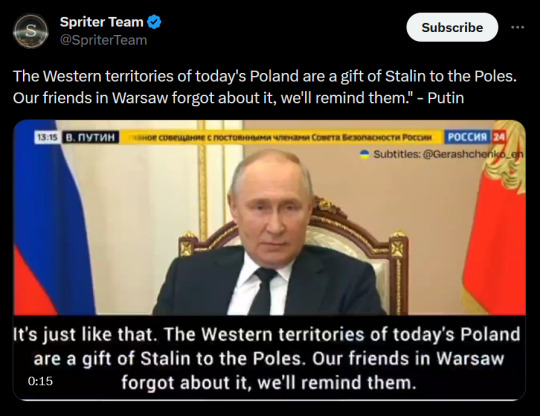
Little pooty's big Polish tantrum…. On 21st July 2023, in a typically deranged rant, Muscovy's fascist dictator Vladimir Putin "reminded" Poland that its western territories were a "gift from Stalin" (among numerous other lies).
He began this particular outpouring of anti-Polish verbal vomit with some unsubstantiated claims that Poland was "hatching revanchist plans" to take territory from Ukraine and Belarus….
Claiming that Poland has ambitions to annex western Ukraine and Belarus, which before the Second World War (and for hundreds of years before the partitions of Poland) were part of the Polish state - and scaring the Russian population into believing that this could happen at any moment - has been a staple of the Kremlin's propaganda for a long time (and is frequently repeated by mindless vatniks and tankies all over social media). However, Russia has no evidence whatsoever to back up these baseless and nonsensical claims. It's true that Poland boosted security at the Polish-Belarusian border in July 2023, but this was in response to the arrival of Wagner Group mercenaries in Belarus, following their short-lived rebellion in Russia (after which their leader was killed in a mysterious plane crash, which I'm sure was a complete coincidence). Putin then went on to claim that Poland "took advantage" of the Russian civil war to "annex some historical Russian provinces"….
Not surprisingly, this was also lie. What actually happened is that after the First World War, newly independent Poland managed to reclaim some of the territory that was stolen by Prussia, Austria and Russia during the partitions of Poland at the end of the 18th century - and that included the aforementioned areas of Ukraine and Belarus, which were historically more Polish than Russian.
Much of what is now western Ukraine has been periodically incorporated into the Polish state ever since the beginning of the 11th century, at the time of the Kievan Rus. And the lands of present day Belarus and Ukraine were part of the Grand Duchy of Lithuania when it was united with Poland towards the end of the 14th century. The entire territory of modern Belarus and most of Ukraine remained as part of the Polish-Lithuanian state until the end of the 18th century. Eastern Ukraine was ceded to Russia in the second half of the 17th century and Russia subsequently stole most of the territory of the Polish-Lithuanian state at the end of the 18th century when it conspired with Prussia and Austria to wipe Poland off the map (just like Hitler and Stalin did 150 years later). As well as most of the lands of present day Poland, Russia acquired all of what is now Belarus and more of Ukraine. The area of western Ukraine that was re-claimed by Poland after the First World War became part of Austria and was therefore never in Russia - let alone a "historical Russian province".
Today's Russian propagandists like to claim that Belarus, Ukraine and Russia have always been one nation, but the reality is that although all three had common origins in the Kievan Rus, they subsequently underwent hundreds of years of separate development before Belarus and Ukraine were incorporated into the Russian empire and subjected to prolonged periods of forced russification.
After regaining its independence and defeating the Soviets in the Polish-Soviet war, Poland and the newly formed Soviet state ended up dividing Ukraine and Belarus between them. The Treaty of Riga, which was signed in 1921, defined Poland's eastern border about half way between where the Polish-Russian border had been prior to the partitions of Poland and where Poland's eastern border is today. Poland basically managed to reclaim some of what it had previously lost. The Soviets renounced their claims to all territory to the west of the new border, but nevertheless they invaded and occupied it two decades later in 1939. Putin then started hypocritically whining about "Polonisation" policies in eastern Poland during the 1920s and 1930s….
Kremlin propagandists like to use tensions between Poland, Ukraine and Belarus over this historical period to create division. Poland had emerged from over a century of foreign rule by the partitioning powers, during which Prussia and Russia had done their best destroy the Polish language, culture and identity in the territories they stole from Poland, by adopting policies of forced germanisation and russification. So it's not surprising that the new Polish government wanted to reassert Polish identity after decades of struggle to regain national independence, which inevitably led to conflicts with Poland's minority populations. However, interwar Poland, for all its faults, was a relatively liberal society compared to its tyrannical neighbours, Nazi Germany and the Soviet Union. Those Ukrainians and Belarusians who found themselves on the Polish side of the border with the USSR missed out on such delightful aspects of Soviet life as forced collectivisation, dekulakisation, the holodomor, the gulags, the Yezhovshchina (purges), the crippling poverty and backwardness, the brutal suppression of their religious and community life and the total lack of freedom. They may not have been overjoyed about living in Poland, but it was paradise in comparison.
Likewise, Poland's minorities were also much better off than, for example, Britain's colonial subjects all over the world and the USA's black and native American minorities. Putin then repeated his previous lies about Poland's "aggressive policy" in the interwar period causing the Second World War….
This is typical Kremlin historical revisionism, as well as being complete bullshit. In 1939, Hitler gifted eastern Poland to his ally Joseph Stalin in the secret protocols of the Molotov-Ribbentrop Pact, which was presented to the world as a simple non-aggression treaty, but was really a plan to carve up Europe between Germany and the USSR - involving the mutual invasion and partition of Poland, a free hand for Hitler to attack Western Europe and for Stalin to annex the Baltic states, Bessarabia and Northern Bukovina, and to attack Finland. The Molotov-Ribbentrop Pact led directly to the outbreak of the Second World War almost immediately after it was signed, and was also the first step in a continuum of collaboration between Nazi Germany and the Soviet Union that lasted for the next two years, until Hitler broke the pact by launching Operation Barbarossa in 1941. Putin also claimed that Poland's "independence and statehood was restored thanks to the Soviet Union"….
This was a bit of a stretch, to put it mildly.
The USSR's occupation of eastern Poland was accompanied by mass looting, rape and murder. This territory had a mixed ethnic and religious population (mainly Polish, Ukrainian, Belarusian and Jewish) which had existed for hundreds of years - until World War 2 - when Stalin and his collaborators killed or ethnically cleansed the Polish population (with a little help from Ukrainian fascists) and Hitler and his collaborators exterminated the Jews.
Between February 1940 and June 1941, Stalin deported hundreds of thousands of Polish citizens to Soviet camps, collective farms, exile villages and various outposts of the gulag system. In 1940 the NKVD carried out the Katyn massacre of 22,000 Polish army officers, police officers, university lecturers, teachers, doctors, lawyers, civic leaders, politicians, government officials, priests and other members of the “bourgeoisie”. Approximately 500,000 Polish citizens dubbed "enemies of the people" were also imprisoned without crime.
The imposition of Soviet rule was accompanied by a campaign of cultural genocide - monuments were destroyed, street names changed, libraries burned, bookshops closed and publishers shut down. The Soviet authorities replaced native teachers with Soviet teachers, introduced communist ideology into schools, forced pupils to learn Russian, limited instruction in Polish and banned the teaching of Polish history.
After the launch of Operation Barbarossa on 22nd June 1941, the NKVD executed thousands of prisoners en masse before running away from the invading Germans.
Nazi Germany's attack on the USSR initially went well, forcing a desperate Stalin to switch sides and join the alliance against Hitler, but the Soviets eventually prevailed (with a lot of help from the capitalist west) and drove the Germans all the way back to Berlin. However, in doing so they didn't restore Polish independence.
The USSR's re-occupation of Poland was accompanied by more looting, rape and murder (and this time the rapes were so extensive that they caused an epidemic of STDs). After the war Poland was trapped behind the iron curtain, subjected to a decade of Stalinist terror and a total of 45 years of Soviet-imposed communist rule. These were wasted years that left Poland bankrupt, destitute and decades behind the countries of western Europe by the time the Polish people were finally able to overthrow Moscow's puppet regime and restore their independence and statehood at the end of the 1980s. As for "reminding" Poland that its western territories were a "gift from Stalin"….
Putin seems to forget that Stalin gifted western Poland to his ally Adolf Hitler in the secret protocols of the Molotov-Ribbentrop pact, after which Nazi Germany invaded Poland from the west and the Soviet Union invaded Poland from the east, in September 1939.
What actually happened at the end of the Second World War is that Stalin turned Poland into a Soviet puppet state and redrew the borders between Germany, Poland and the USSR, incorporating eastern Polish lands (which he'd initially acquired as a result of the Molotov-Ribbentrop Pact) into the Soviet Union and a smaller area of eastern German lands into Poland, as "compensation". Almost the entire German population of what was now western Poland was then ethnically cleansed and sent to the newly formed Soviet puppet state of East Germany, after which the remaining Polish population living to the east of Poland's new border with the USSR was ethnically cleansed and sent to replace the departed Germans in the west. Apparently, being kicked out of your home after your country has been stolen, and then being forced to go and live in a destroyed and depopulated wasteland hundreds of miles away, is a "gift".
There's a reason why Poland and other countries that Russia invaded and plundered over the centuries, and were also invaded and plundered by the USSR during the Second World War (after which they were forced to live under Soviet occupation for the next half century), rushed to join NATO as soon as they could after overthrowing Soviet rule. It's because ever since the collapse of the USSR, Russia has repeatedly shown that it doesn't respect their right to exist, and it's clear that there can be no long term peace and stability in Europe while Russia still threatens its neighbours and harbours imperialistic ambitions to restore its former empire.
NATO is the main obstacle that prevents Russia from achieving this goal.
NATO poses no threat to Russia's internationally recognised borders, but it does - quite rightly - stand in the way of Russia's desire to expand them.
#vladimir putin#little pooty#history#russia#ussr#soviet union#joseph stalin#germany#poland#second world war#world war 2#vatnik#tankie#historical revisionism#ethnic cleansing is a gift
13 notes
·
View notes
Text
The Chilling Testimony of a U.S. Neurosurgeon Who Went to Gaza to Save Lives
Haaretz: Netta Ahituv May 9, 2024
When everyone who was able to flee from Gaza was doing so, Dr. David Hasan made the reverse journey. His story is a must-read for every Israeli
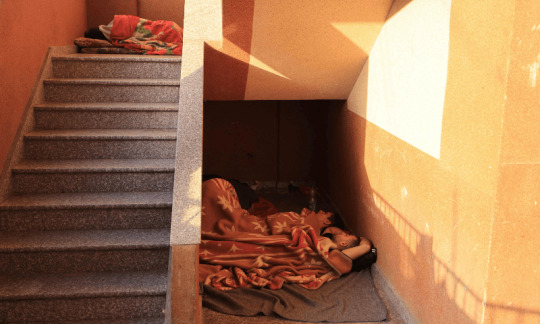
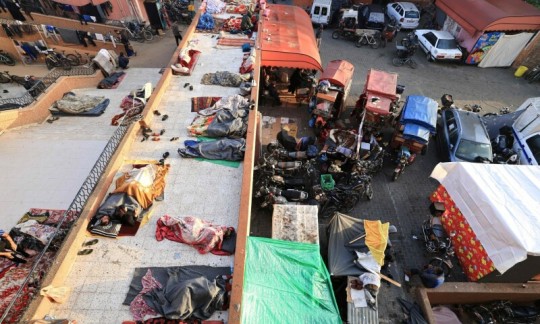
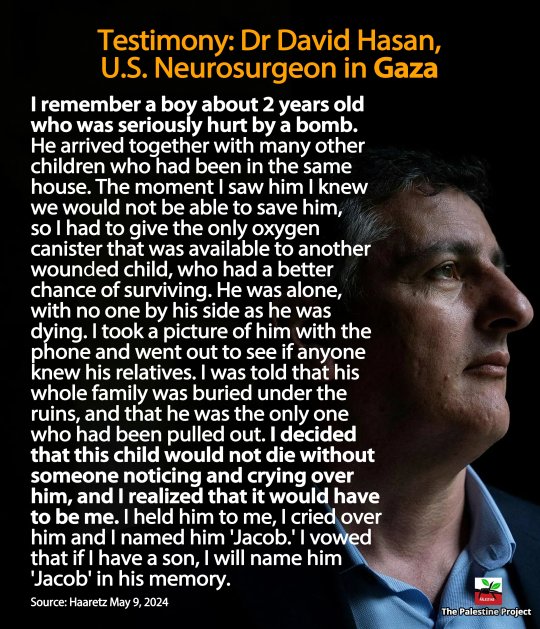
At the end of December 2023, when everyone who was able to flee from the Gaza Strip was doing so, Prof. David Hasan made the reverse journey. Hasan, a senior neurosurgeon and an esteemed researcher at Duke University in North Carolina, decided to fly to Cairo and from there to make his way to Rafah and enter Gaza.
"Until the war broke out, I was focused on advancing my career and taking care of my family," Hasan, who is 50, tells Haaretz in a video interview. "But this situation – which touched me from both sides [of the border] – overwhelmed me emotionally and pulled me in. I felt I had to do something to help."
Hasan was a member of the first medical team – consisting of 18 physicians from the United States, Canada and England – to enter the Strip after the start of the war. They arrived through Rahma Worldwide (an American humanitarian organization) and the organization Medical Aid for Palestine, under the auspices of the United Nations and the World Health Organization.
"The UN and WHO facilitated our entry and assisted with regard to the medications and surgical equipment we brought with us," Hasan says. "But they also informed us in advance that once we entered Gaza, they would have no way of providing us with protection." The doctors were asked to sign a document waiving the UN of any responsibility for their welfare, which, he says, "made the situation all the more threatening."
Their mission was to get to the European Gaza Hospital, near Khan Yunis in the southern Strip, and spend a week there performing surgery on adults and children. Then, less than two months ago, Hasan entered Gaza again on a similar mission, and saw firsthand the transformation that had taken place there since his previous visit.
"The first thing you see in Rafah," he relates, "is miles and miles of hanging fabrics – the tents of the displaced people, which are erected against the background of the ruins of buildings. When you turn onto Saladin Road, which is the main road connecting Gaza's north and south, suddenly you see an ocean of people. These are the displaced people who live there now. As you get closer to the hospital, you see more and more people, and more and more tents."
The hospital itself looked like a refugee camp, Hasan says. "I was confused, because I had never seen so many people living inside a hospital. Every corner there was occupied by a group of people. They made use of every available item – a small curtain, a staircase, a plastic chair – and turned it into their living space. Entire families huddled on squares of two meters by two meters, and ate, drank and slept there. Walking in the hospital, you had to be careful not to step on people."
On the day he entered the Gaza Strip in December, Hasan notes, he didn't see Israeli troops or hear explosions. "I thought the war was in some kind of lull. But as soon as evening fell, heavy shelling started, and I realized that there were many Israeli forces around the hospital – you just don't see them during the day. The noise of a one-ton bomb is deafening. The first time one was dropped nearby, I happened to be standing on a stool, and I fell off, because the building shook so hard. It went on like that every five or 10 minutes. I asked the local doctors what to do, and they told me that you get used to it and that I should just keep working to distract myself from the anxiety."
Where did you sleep? What did you eat?
"I slept in the hospital, ate mostly energy bars that my wife and daughter had packed for me, and drank mineral water. The water situation there worries me the most, and since returning for the first time, I have talked about water sanitation everywhere and with everyone I can. We lost many patients due to water-related infections."
Immediately upon arriving at the hospital, the physicians began operating. "In the process, we discovered that there weren't enough anesthetics, not enough equipment and not even clean water to wash our hands between operations. Sometimes there were no gloves and sometimes we lacked basic medicines. We were compelled to perform limb amputations without anesthetics and C-sections without sedatives. In order to do as much as we could, we would operate on two patients at the same time in the same operating room."
Throughout his first week there, Hasan relates, there was constant, heavy shelling. "During the night, it was not possible to rescue anyone from the ruins, both because there was no electricity and everything was dark, and also because just being outside was dangerous. So people who were wounded during the night remained where they were until morning. Many of them died from loss of blood or reached us in worse condition because they did not receive immediate treatment. Every morning around 8, a wave of wounded people arrived who had been rescued from the ruins of the night. At that point, around nine out of 10 of them could not be saved.
"The hospital has only 250 beds, so at any given moment, you have to make difficult decisions, as there were about 1,200 wounded. He can be saved, she can't, this wound requires resources that we don't have, we may be able to treat this wound. The feeling is that it would have been possible to save many of the wounded if we had more medical equipment, intensive-care beds and the possibility of hospitalizing them for further treatment."
Are there any of the wounded whom you remember in particular?
"From a medical point of view, I remember a boy of maybe 12 or 13 years old, who arrived with bleeding from his eye, from being hit by shrapnel. It was clear that he needed surgery, but there was a two-hour line for the operating room. During the wait, a main artery burst inside his brain and blood began spurting from his eye. I'd never seen anything like that before. He died, of course.
"From a humanitarian point of view, I remember a boy about 2 years old who was seriously hurt by a bomb. He arrived together with many other children who had been in the same house. The moment I saw him I knew we would not be able to save him, so I had to give the only oxygen canister that was available to another wounded child, who had a better chance of surviving. He was alone, with no one by his side as he was dying. I took a picture of him with the phone and went out to see if anyone knew his relatives. I was told that his whole family was buried under the ruins, and that he was the only one who had been pulled out. I decided that this child would not die without someone noticing and crying over him, and I realized that it would have to be me. I held him to me, I cried over him and I named him 'Jacob.' I vowed that if I have a son, I will name him 'Jacob' in his memory.
"Another case I remember is of three siblings – a 10-year-old boy, a 6-year-old girl and a baby boy of one and a half. According to what I was told, they had been in a house that was surrounded by Hamas activity. Israeli soldiers entered the house at night. In the dark, they thought the father was a Hamas operative and they killed him. The mother ran toward the father and she was killed too. The two parents lay there dead, but outside there was bombing taking place. The three children lay down on their parents until the sun came up. Not until morning did people come to take them out of the house. Someone brought them to the hospital.
"I remember that the eldest son held the little one and calmed him because he was crying, and at the same time took care of his sister, who didn't stop shaking like a leaf in a storm. They were covered with their parents' blood. We cleaned them and I brought them some toys and small dolls that my daughter had asked me to give to the children in Gaza. When I gave them the toys, I saw a small smile and they said to me, 'Thank you, Uncle David.' You could see that they were educated and polite children. I was relieved to learn that at some point a relative came and took them. I will never forget them – the thought of the shocking night they went through and the way the 10-year-old, the senior among them, suddenly became a parental figure."
David Hasan was born and raised in Kuwait to a Muslim Palestinian family, who had immigrated there from the West Bank in 1967, following the Six-Day War. It would not be the family's last war-induced emigration. The second time was in the Gulf War, in 1990, when they relocated from Kuwait to Jordan. Hasan, who had always dreamed of becoming a doctor, was accepted to premed studies in the United States and moved there alone at the age of 18.
Where did your unusual combination of names come from – a Jewish first name and an Arab surname?
"When I moved to the United States, I connected mainly with Jews and Israelis, and they helped me acclimate. They accompanied me through various crises, and I decided to change my name from Emad to David. I also had two Jewish girlfriends, one of whom I accompanied on a visit to Israel. By then, I already had an American passport, but in Israel they wouldn't let me enter and wanted to deport me on the next flight to the United States.
"This was a traumatic experience for my girlfriend, so I insisted on talking to the security manager and told him that instead of kicking me out, they should give me a prize. 'A prize? Why should I give you a prize?' he asked. I replied that thanks to me, my girlfriend had come here for the first time in her life. Jewish donors and the State of Israel pay so much money for Jews from all over the world to visit Israel, and here I was, at my expense, inviting a Jewish woman who would never have visited here if I hadn't insisted on it. He went off, muttering, 'It's only in fucking America that Palestinians go out with Jews.' After a while, I was informed that I could enter Israel. Other than that episode, I remember the visit fondly."
Hasan is married to Lauren Hasan, who worked as a trauma surgeon, and they have a 7-year-old daughter. They live near Duke, a private university in Durham, North Carolina. Hasan does clinical work, research and teaching and is considered a leading expert in the field of cerebrovascular disorders and brain-tumor surgery. He has published more than 270 scientific articles in major journals.
Hasan does not hesitate to attest to his love for Israel and Israelis, and talks about close friends in the country. He also has close ties with the Israeli NGO Physicians for Human Rights and with the Arava Institute for Environmental Studies, with both of which, together with UNICEF (the United Nations Children's Emergency Fund), he is trying to promote emergency water purification projects in Gaza. They have already received approval from Israel's Coordinator of Government Activities in the Territories and a promise of funding from USAID.
Asked how he reconciles the Israeli-Palestinian dissonance in his life, he replies simply, "I distance myself from groups that label the Israelis as only one thing and the Palestinians as another. I focus only on moral actions and on ways in which I can help practically."
American universities, including Duke, have become an arena of protests over the war. How do you deal with this?
"We launched an initiative at the university that offers all students the opportunity to be active in assisting victims of the war in all kinds of ways, as they wish, on whichever side they choose. We thought this would allow people to channel their anger into action instead of protesting and arguing among themselves. So far, it seems to be working well. I have already brought in Duke students – Palestinians and Jews – to be part of the water project and work together as a team. I tell my medical students that just as doctors are expected to be blind to their patients' origin, skin color, religion or gender, their attitude toward victims of war should be the same – I suggest to them to think about human beings and not about 'sides.'"
Hasan practices in his life what he preaches to his students. He went to help the Gazans, but the Israeli hostages in the hands of Hamas haunt his thoughts, and he brings up the subject frequently during his interview with Haaretz. On his first visit to Gaza, Hasan hoped he would be able to pressure the appropriate people to talk to members of the Hamas leadership to allow him to visit captives in order to assist them medically. He was warned that even raising the subject would endanger him and the entire delegation, but he insisted. In any event, it didn't happen, of course. No one knows if the request even reached any Hamas officials. Again, in his second visit to Gaza, in March, he put out feelers about the possibility of offering the captives medical aid. Once more, to no avail.
"I walked around the hospital and looked, searched and asked everyone I could if they had seen, heard or knew anything about them [the Israeli hostages]. I also looked for people with weapons, who might be guarding some room, but I didn't see anything like that either. As someone who saw what Gaza looks like aboveground, I can only imagine how terrible the conditions are for the hostages. I assume they don't get enough food, access to a shower or medical services. I also read the testimonies about sexual assault. God knows what condition they are in. I feel pain for them and their families and wish for their release as quickly as possible."
On the last day of the first trip to Gaza, Hasan began sweating and developed a fever. Once he left the Strip, he found out that he was infected with COVID-19, although he had of course been vaccinated. On the second trip, too, he returned home with a mysterious virus. "The situation in Gaza is the perfect storm for viruses – a combination of wounds that become infected because they cannot be cleaned properly, hospitals without proper sanitation and an absence of antibiotics. Add to that water unfit for drinking and a generally appalling sanitary situation. Almost every person we operated on died a few days later, due to infection. It suddenly came to me that surgery was like a death sentence for them. At one point I asked myself what I was doing there if I couldn't save people."
And what was your conclusion?
"That I should continue to do my best. Even if I saved one person, it is still worth the effort. From Judaism I learned that whoever saves one soul, it is as though he saved an entire world. I wanted to be a part of the hope in this conflict and make a difference, even if a small one, for the people who were hurt in it and are considered 'collateral damage.'"
What did you feel when you left the first time?
"Leaving is a bittersweet moment. On the one hand, it's a relief, and on the other hand, I was heartbroken and felt guilty for leaving these people, who need me. I have the option to leave, they don't. From being faceless numbers that I read about in the news, they became for me human beings with names, stories, aspirations and dreams. My consolation is that at least they saw that there were people who cared about them, people who had come a long way and were risking themselves for them, and maybe that would give them hope. I told them that although my body was leaving Gaza, my heart was staying there with them."
In mid-March, some two and a half months after the first visit, Hasan arrived in the Gaza Strip again. This time it was through Medtronic, one of the world's largest producers of medical devices, which was shipping equipment into Gaza. "On Friday I performed a complex operation at Duke Hospital, and within hours I was on my way to Cairo, with half a million dollars worth of medical equipment," Hasan relates. "In Egypt, I was able to get another ton of diapers and baby food, and then went on to Rafah."
There was a palpable difference between the two visits, Hasan relates. To begin with, the second time, there were fewer bombs falling, and they were smaller. On the other hand, however, he encountered more hunger and a higher density of displaced people. "I saw people who had clearly lost a great deal of weight and many more cases of infectious diseases. Mothers arrived with no milk to feed their babies, they were so weak. I remember one woman in her late 20s, an engineer by profession, who told me, 'Dr. David, my baby is crying and I can't do anything. You know Israeli women, right? Maybe you can appeal to them, in the name of the solidarity of women and mothers, to get them to request that at least we can have food for our babies sent to us? Tell them that here too there are mothers with feelings and aspirations for their children.'"
On the second visit, there were fewer medical staff evident, Hasan recalls, and those who were there showed signs of extreme burnout. "They don't earn money, their children are dying at home, and in addition, every trip to the hospital and back entails risking their life or getting bad news from home. Two doctors who worked alongside me returned home after a 24-hour shift and found that their families were buried under the ruins of the house they were in. Many of them felt that they had done their part and now had to worry about the survival of their own families. Those who remained were so exhausted that they developed indifference. A wounded person would arrive, and they would say it was preferable for the person to die, because we didn't have the means for taking care of him. I will not forget taking care of a 5-year-old boy with burns all over his body, who himself told me, 'I wish I was dead. ' At some point I also started to think that it would be better like that, because to be born a weak baby in Gaza means suffering a death sentence in agony."
In addition, Hasan relates, "There was a feeling of chaos, that things were much less organized than last time, that there was no authority or hierarchy. Everyone is worried about their own survival, hunger has an effect, and all kinds of groups were taking advantage of this situation in an awful way. Patients now began arriving who had been shot by [other] Palestinians in fights over food. Imagine hungry people who haven't eaten in days and have children to feed. They will do anything to get food."
The chaos Hasan describes almost cost him his life. On the way from Cairo to Rafah, the Egyptian driver asked him to deliver a bag of sweets to a Palestinian family he knew in Gaza for the Ramadan holiday. Hasan agreed and asked the driver to tell the family to look for him at the hospital. But when he arrived to collect the medical equipment at the border crossing, he discovered that it was not one bag but three huge sacks of sweets. It was certainly not a gift for a family.
He went up to one of the guards at the border, explained the situation and asked him for his advice. The guard explained to him that Egyptian and Gazan merchants were trying to take advantage of the situation to sell things at high prices – the goods he had might fetch thousands of dollars on the black market. He suggested that Hasan leave the sweets there and promised that he and his colleagues would distribute them for free to children for the holiday.
"On the way to the hospital, my phone kept ringing," Hasan recalls. "It turns out that these were the people to whom I was supposed to deliver the sweets. That night, at the hospital, about 10 people with guns suddenly appeared and demanded the candy. They said they were members of Hamas, but later it turned out that they weren't, they just wanted to scare me. It was actually a family that had seized control of a share of the black market. They told me that they knew my name was David and that I was actually an Israeli."
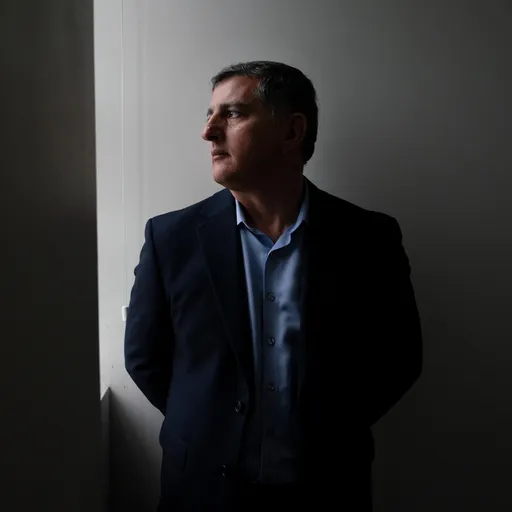
Hasan. "I walked around the hospital and looked, searched and asked everyone if they had seen, heard or knew anything about the Israeli hostages." Allison Joyce/AFP
The Chilling Testimony of a U.S. Neurosurgeon Who Went to Gaza to Save Lives Haaretz Netta... | Middle East (similarworlds.com)
Detroit doctor has never seen anything worse than crisis he witnessed in Gaza
Detroit doctor has never seen anything worse than crisis he saw in Gaza (freep.com)
Facebook
youtube
#genocide#gaza#palestine#free palestine#news#medical#humanitarian#humanity#human rights#war crimes#crimes against humanity#euronews#isreal#Dr. David Hasan#neurosurgery#Youtube#bafta awards#aurora borealis#jacob anderson#mothers day#unique gifts#david tennant#baftas#bafta 2024#eurovision#c4news#bethlehem#ethnic cleansing#doctor who#formula 1
28 notes
·
View notes
Text
Footnotes in Gaza
Award-winning journalist and cartoonist, Joe Sacco, talks about his latest book, FOOTNOTES IN GAZA.
youtube
Joe Sacco, author of 'Footnotes in Gaza,' on journalism and Palestine | The Chris Hedges Report
youtube
Footnotes in Gaza - Wikipedia
Gaza 1956. En marge de l'histoire by Joe Sacco | Goodreads
Footnotes in Gaza
















#gaza#free gaza#rafah#all eyes on rafah#save rafah#cartoon#caricature#Youtube#bafta awards#aurora borealis#jacob anderson#mothers day#unique gifts#david tennant#baftas#bafta 2024#eurovision#c4news#bethlehem#ethnic cleansing#doctor who
643 notes
·
View notes
Text
Not gonna lie, I'm a bit tired to see the constant argument that people on Tumblr do not have money to donate anymore . We're getting into the Christmas season, with people buying gifts and preparing for Black Friday yet no one can spare to give $5 to a fundraiser ?
I'm always thinking about what the team @/gazafunds posted on twitter, about how they started packing their own lunch and giving up on many things to be able to donate to fundraisers, on top of working endlessly to verify campaigns, making an managing their website etc. Why do the people most affected by the genocide are the one making the most sacrifices ? Even if you are not Arab and/or Palestinian, shouldn't you feel horrified all the same by an ethnic cleansing?
No one is asking for Tumblr users to stop their life and never buy anything ever again, but I find it very concerning to see Palestinian work to the bone to vet and support fundraisers while most people just don't care and reblog "free Palestine" posts without doing anything substantial.
It's not too late to help though. Many people would benefit from getting help, one of them being Shahed (@shahdhatem) for who donations are getting even more scarce. She's one of the kind souls who spent her time during the last year supporting other victims of genocide by treating injuries, distributing food and teaching children who couldn't go to school anymore. Please consider helping her and her family get through these horrors by donating .
Donate here | Commissions in exchange of donations | Vetted by @/nabulsi
Also please check out @/gazafunds site and sudanfunds.
3K notes
·
View notes
Text
January 16, 2025
(...)
"Still, we shouldn’t give Trump too much credit. Little fundamentally changed when it came to the leverage he was willing to use to influence Israel’s conduct. As far as we know, Trump never threatened to condition military aid to Israel. Nor did he indicate that he would reconsider his predecessor’s practice of ignoring international law in order to shield Israel from accountability on the world stage.
Some will argue that Trump’s threats and the collapse of several resistance fronts across the region forced Hamas to make concessions in the negotiation process. But it wasn’t Hamas that needed convincing — they had already agreed to earlier ceasefire proposals that were largely indiscernible from the current deal, going back to May 2024. In the end, it was Israel that needed the push, and Witkoff likely signalled to Netanyahu that despite not sharing Biden’s blind fealty to Israel, Trump would actually do more to reward cooperation.
The fact that Netanyahu has so far decided to refrain from scuttling this ceasefire agreement shows that he is confident he can gain something significant in return. The Israeli media is already reporting that Trump’s ceasefire “gift bag” to Netanyahu could include a long list of treats, from lifting sanctions on Israeli NSO Group’s spyware Pegasus and on violent Israeli settlers, to giving Washington’s blessing to major West Bank land theft or outright annexation, and permitting or even facilitating a direct attack on Iran.
But it’s not just about what Israel is getting in return for a ceasefire. It’s also about what it has already received.
In the eight months since Israel first rejected an almost identical deal, to which Hamas had agreed in principle, its army has slaughtered tens of thousands of Palestinians and decimated large swaths of the Gaza Strip. This was the price of Israel achieving its true objectives: not eliminating Hamas or securing the release of hostages — many of whom were killed while Israel stalled on a ceasefire — but the destruction and “thinning out” of Gaza and the reshaping of the Middle East.
The facts on the ground in Gaza today paint a picture that we cannot yet fully comprehend. Israeli forces have demolished entire neighborhoods in order to widen the buffer zone that encircles the Strip, expand the Netzarim Corridor that bisects the territory, and ultimately carve up the enclave for a future of perpetual control. In doing so, they have seized over 30 percent of Gaza’s pre-genocide territory, while rendering much of the rest of it uninhabitable.
Meanwhile, Israel has largely completed the so-called “General’s Plan” — the ethnic cleansing of the entirety of northern Gaza above Gaza City. Beit Hanoun, Beit Lahiya, and Jabalia, cities that were once collectively home to over 300,000 people, have been reduced to rubble, as part of a campaign to depopulate the area and entrench Israeli control while laying the groundwork for building Jewish settlements.
Elsewhere, Israel closed its front with Hezbollah, and the fall of Assad allowed it to seize more land in the Golan Heights and the eastern slopes of Mount Hermon/Jabal A-Shaykh. Meanwhile, in the West Bank, state-backed settler attacks on Palestinians have increased in frequency and brutality, while the Palestinian Authority serves as a full partner in the Israeli army’s intensifying crackdown on resistance in Jenin, Nablus, and Tulkarem.
(...)
Even if the ceasefire agreement does not survive past the initial 42-day period, it will no doubt save countless lives and give Palestinians a chance to breathe, eat, grieve, and receive medical treatment. Yet while the phased approach to the agreement is supposed to make reneging difficult for Israel, that depends on enforcement. Right now, the only thing standing in the way of the resumption of the annihilation once the ceasefire starts to take hold is an international community that has abandoned Palestinians for more than a year.
Key members of Netanyahu’s far-right coalition have already warned that they will not accept anything less than a continuation of Israel’s assault on Gaza after the first phase of the agreement is completed, even at the expense of the remaining hostages. And after taking credit for achieving the ceasefire in the first place, there is no indication that Trump will hold Israel accountable or pressure Netanyahu to follow through with the second and third phases of the agreement.”
...
88 notes
·
View notes
Text

SMOKE CLEANSING 🍃
Part 2 of the cleansing series!

First of all, some herbs, rituals & pratices are considered closed practices. This means that practionners outside from the ethnic & spiritual background in which these rituals are usually performed should not try to recreate them. This allows the communities from which those practices stem from to regain the respect & the rights they deserve since, most of the time, those people & their culture were forcefully assimilated or forbidden to practice at some point.
What I understand from the concept of closed practices comes from articles such as the ones below. I'm putting this message here since the most relevent example of spiritual cultural appropriation is currently smudging & the burning of white sage.
The Ethics Of Burning Sage, Explained by Nylah Burton & Jay Polish
Witches urge alternatives to sage amid concern about appropriation, overharvesting by Emily McFarlan Miller

On top of the cutural aspect of smoke cleansing, the enviromental aspect is also important. Cleansing ingredients, just like any natural ingredients, are a gift from the Earth & should be used with gratitude. To me, the best way to cleanse would be with herbs grown locally & ethically. Encouraging local businesses is also so rewarding! Some herbs can also be grown in your own home! 🪴🌱
Smoke cleansing is not my favourite. Finding local herbs is not that hard, but some other processes are much more simple or fun like making cleansing potions.
A few things I personally think are good for smoke cleansing are:
Rosemary - purifying, protection & love
Bay leaves - prosperity & healing
Thyme - healing, protecting & purifying
Cinnamon - abundance & protection
Local incense sticks*
Hope this helps a little bit. Remember, it doesn't need to be too exotic or complicated to work. Grocery stores are a valid place to shop. ☀️
Tip me, if you feel so inclined
*I used to have an esoteric shop in my city that made their own incense sticks. Those were very nice, but sadly they closed down. I still have a few.
#spiritual cleansing#cleansing#energy cleansing#smoke cleansing#sage#herbs#witchcraft#simple witchcraft#witch#witch stuff#witchblr#pagan blog#pagan witch#witchy things#paganblr#witchcore#magick#witchcraft community#easy witchcraft#beginner witchcraft#baby witch#witches#beginner witch#witch blog#witch community#witch tag#witch tips#witches of tumblr#witchlife#witchy vibes
33 notes
·
View notes
Text
Man, Storm got dunked on so hard back in the day for being snippy with Rogue over the "cure".
"It can't cure you because there's nothing wrong with you," Storm says to a girl who's been upset for three straight films about her uncontrollable powers killing anyone she ever touches. Not all of us get to be weather goddesses. Maybe check your mutation privilege before you start speaking for all mutants about what a gift mutation is.
But at the same time, she is absolutely right to be skeptical. Absolutely right.
This is where the metaphor breaks down a little. The ability to suppress mutation could be a gift to mutants who genuinely did get fucked by the Superpower Lottery.
Remember that kid in Ultimate X-Men who uncontrollably vaporizes everyone in his vicinity and Wolverine had to kill him? Because the Ultimate comics were addicted to grimdark ultra-seriousness? Boy, wouldn't it be nice if he could just get a little jabby-jab and then he's fine?
If this was something that Xavier came up with to curb the abilities of mutants who wanted out, that would be one thing.
But here's where it syncs back up with the metaphor. Because the problem is that the human majority in power cannot be trusted with something like this. If it can be weaponized as a tool for genocide, it cannot be in the hands of the people who would commit genocide.
Like. It takes them no time at all to start loading cure darts into guns. Like. The fucking audacity. You're living your best life, being gay, doing crime, and the cops show up and shoot you full of the chemicals that turned the frogs straight. Nuh-uh. Unacceptable.
And that's not getting into the problem of using it as conversion therapy. Even if we go, "Okay, we won't make guns that shoot ethnic cleansing, I understand why you might have concerns about that," there's still the problem of fucking parents.
When a 14-year-old shows up and says, "I want you to inject me with the stuff that will make my lizard tail fall off," do they actually want that? Or did their bigoted parents convince them that mutation is a sin and that their lizard tail makes them unworthy of love? Who's actually saying, "I want my mutation removed?" The kid or the kid's parents talking through them? How do you tell?
There is some merit to the cure's existence as a fantasy element, strictly within the literal text of mutation. And a fuckton of drawbacks that all connect to both the literal text and the metaphor of what mutation represents.
26 notes
·
View notes
Text
I extend my deepest and most heartfelt greetings on this Christmas to our Christian brothers and sisters who are enduring unimaginable suffering genocide, ethnic cleansing, and forced displacement in northern Gaza. They face the same merciless bombardment that rains down on us all, their existence threatened, their voices silenced, and their sacred spaces violated. The Christians of Gaza have stood with us through every tragedy, offering their homes and their hearts to shelter both Muslims and Christians alike. But now, their homes lie in ruins, their churches bombed, their loved ones buried under the rubble. These churches, which once resonated with prayers for peace, have become tombs of sorrow, holding the memories of children, families, and lives unjustly taken. This Christmas, they sit in dark, crumbling sanctuaries, surrounded by the echoes of loss. There are no hymns, no joy, only the muffled cries of children clinging to their mothers, the faint whispers of prayers for survival, and the silent, unyielding determination to exist despite the world’s indifference. They light no candles of celebration only the dim glow of resilience against the darkness that envelops us all.
Every year, we celebrated with our Christian neighbors. We helped them decorate their Christmas trees, shared in their joy, and savored the sweet chocolates they gifted us with so much love. Now, the streets that once brimmed with the warmth of Christmas are cold and lifeless. The trees are gone. The chocolates are dust. The laughter has been replaced by the sounds of explosions and the wails of mourning.
For two years now, we have been robbed of sharing their holidays, just as they have been robbed of ours. There are no celebrations anymore only memories of a time when we could dream together, laugh together, live together.
Please feel free to share this with others who may wish to contribute. May God bless you all. 🇵🇸
🔻GoFundMe

#barbara palvin#free gaza#news on gaza#palabras#crystal palace#paleoart#color palette#palestine resources#pro palestine#palestine gfm#help gaza#family#war on gaza#gaza gofundme
17 notes
·
View notes
Text
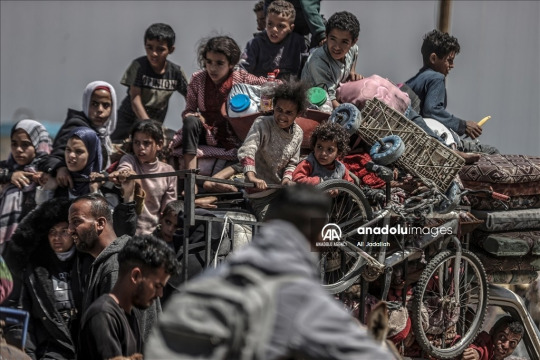
Palestinians leave their homes after increasing Israeli airstrikes in Rafah 08.05.2024
RAFAH, GAZA : Palestinians with their packed belongings, continue to depart from the eastern neighborhoods of the city due to ongoing Israeli attacks in Rafah, Gaza on May 8, 2024. ( Ali Jadallah - Anadolu Agency)
Anadolu Images on X: "Palestinians with their packed belongings, continue to depart from the eastern neighborhoods of the city due to ongoing Israeli attacks in Rafah https://t.co/QlALy4WTlg 📸: Ali Jadallah https://t.co/MCahslQadZ" / X (twitter.com)
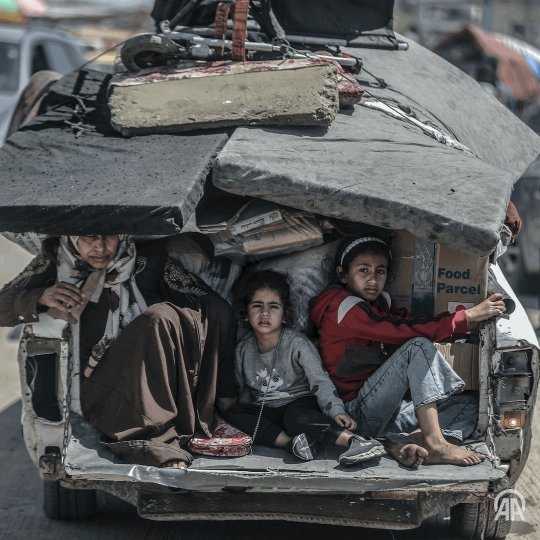
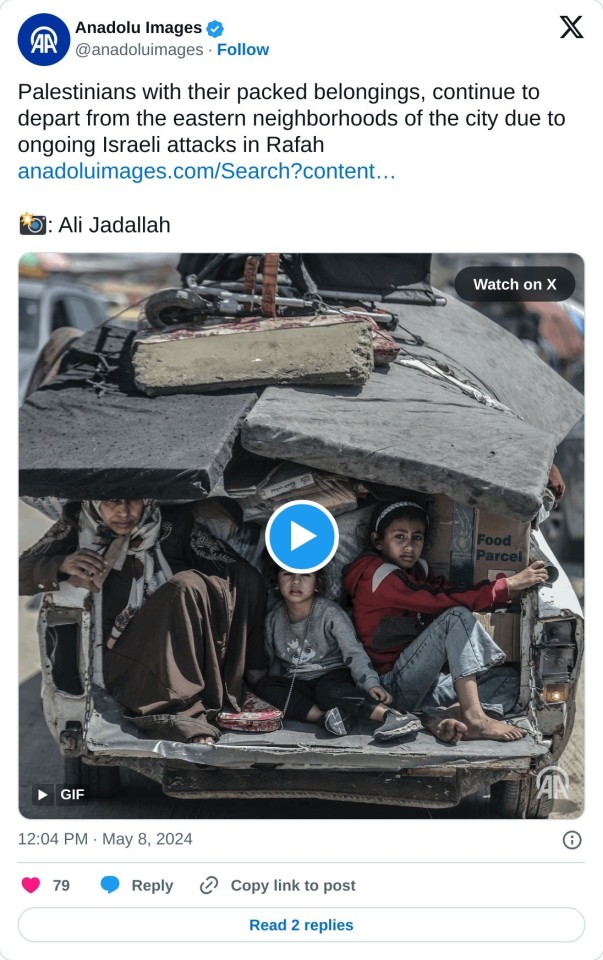
ALT
View on Twitter

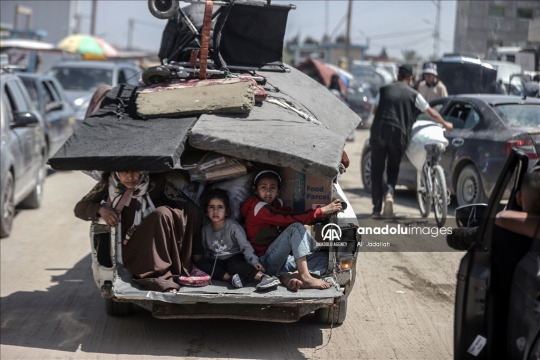
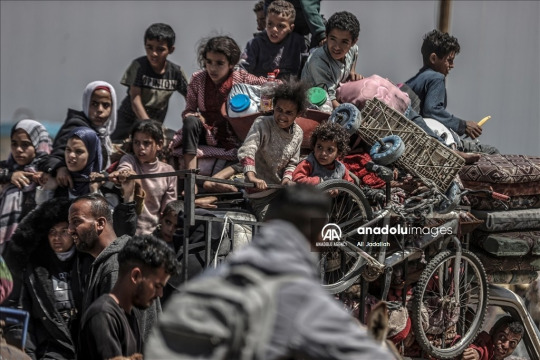
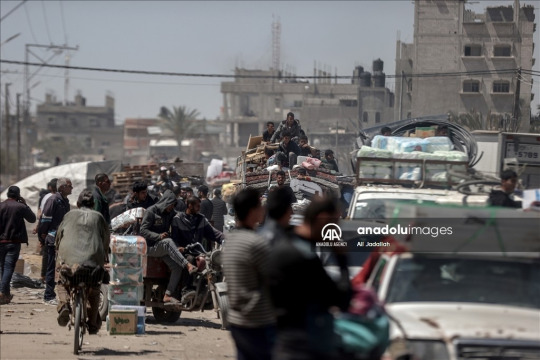
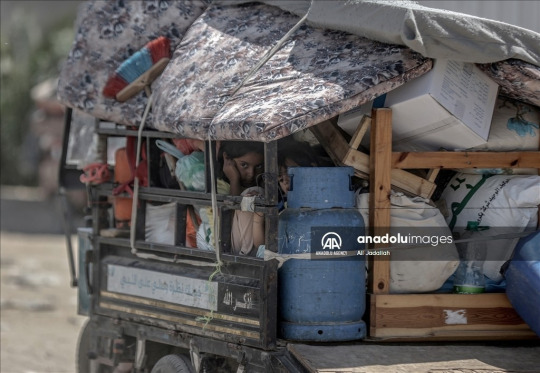
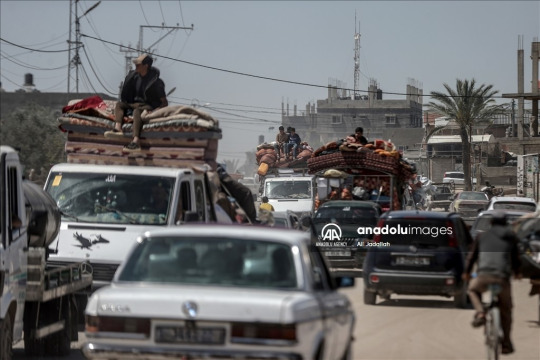
#palestine#gaza#rafah#genocide#free palestine#news#all eyes on rafah#save rafah#Deir al-Balah
#genocide#gaza#save rafah#rafah#all eyes on rafah#save the children#palestine#freedom#save palestine#free palestine#save gaza#crimes against humanity#gaza genocide#bafta awards#aurora borealis#jacob anderson#mothers day#unique gifts#david tennant#baftas#bafta 2024#eurovision#c4news#bethlehem#ethnic cleansing#celebrities#BRIDGETON#MESHI#news#doctor who
20 notes
·
View notes
Text
Israel’s progression from Apartheid to Genocide
The unfolding genocide in Gaza is the latest chapter in Israel’s attempt to remove Palestinians from their land. All those calling for a ceasefire should join in the longer-term efforts to dismantle Israeli apartheid.
For Palestinians, Israel’s violence began long before October 7, 2023. The unfolding genocide in Gaza is the latest chapter in a series of Israel’s settler-colonial practices to remove Palestinians by force from their land. These practices began with the inception of the state of Israel.
[...]
Israel has repeatedly targeted Gaza for particularly brutal violence for three main reasons: The people of Gaza are known for their resistance to Israel’s occupation and apartheid throughout history, the majority of people in Gaza are refugees from towns and cities across the border, and Gaza has one of the highly densely populated centers in the world. Some Israelis say Gaza should be turned into a parking lot, a genocidal statement that unfortunately was echoed by U.S. Congress member Max Miller. Israeli settlers have also promoted the idea of turning Gaza into a new beach resort and gifting it to Israelis fighting in the army and their families. The genocide of the Palestinians was seen by right-wing political parties in Israel as a pre-condition to recolonize Gaza, which would help them realize their goal of Greater Israel. These all reflect the same genocidal logic of wanting to remove Palestinians in Gaza, and elsewhere, from the land and seeing them as non-existent. Ultimately these quotes and attitudes show Israel is now progressing from apartheid to genocide and extermination. As the history above, and the events of the last eight months, show, the Israeli government has never been satisfied with the presence of Palestinians, not in Gaza, in the West Bank, or in Israel itself. For decades, Palestinians were managed through ethnic cleansing, exploitation, extermination, and apartheid policies and practices. When these policies didn’t achieve the desired objectives, Israel has now turned to genocide against Palestinians to push them out of Gaza and take full control of the territory.
6 notes
·
View notes
Note
So do you believe Hashem is a corporeal being that is an “interfering Gd?” I’m curious how you reconcile that the horrific trauma going on in the world right now. I’m one of the jaded people who go “If Hashem aides us and is an “interfering gd,” why didn’t he prevent 10/07? Why don’t he prevent the Shoah? 9/11? The actual ongoing genocide in Sudan? The actual ethnic cleansing of the Rohyngia? Are there limits His power that we don’t know about? Why can’t we know about them?”
I don’t think I’m an atheist, but as mentioned, I struggle with the idea that Hashem is an actual being to speak to. So I’m trying to figure out how I see Hashem, and I’m always genuinely curious at those who see Him as a being?. How do you reconcile it with all of the current and past horrid things going on in the world?
There’s a lot to unpack here. First and foremost, I am not a Rav. Even if I were, this is not a question a Rav would ever answer. Ultimately the question of why do bad things happen to good people? has a different answer for everyone because it really does come down to your personal relationship with G*d and only you know what that relationship is. So this is a big ask for some random Jew on tumblr but I’ll do my best to give you a somewhat coherent response.
I am overtired and delirious so excuse the rambling that’s about to happen…
For me, I don’t like the word interfering when referring to Hashem. Everything going on - everyone and all of their actions - is a result of Hashem’s work. You cannot interfere with your own creation. Interference connotes a disruption but Hashem isn’t disrupting anything. If something is happening, it is his plan that it do so. However, while I do believe that Hashem is in charge, humans also have free will. Hashem can guide and direct but ultimately he is not in complete control because even humans made in his image are susceptible to error. Hashem can and has given us the tools to create the world how he wants it but ultimately it is up to us in how we use them. Hashem has given us the tools to take care of ourselves and one another and maybe we have abused those tools or disregarded them and him completely. Is this why bad things happen? Is Hashem allowing tragedy because our own human error is ruining his original plan? I think so. This is my true belief. But ultimately I don’t know. No one does.
Where was he during the Shoah and where was he on October 7th? I don’t have an answer for you. I’m angry at him. I’m still trying to make sense of it. I know we did not deserve what happened and I still struggle to see how any of this mess fits into his plan. But I trust that it somehow does. And for what I cannot explain and understand, my faith in Hashem guides me. I could not control any of the horrible things that happened but I can use the tools Hashem has gifted me with to repair my world going forward - my work as a doctor, the volunteering I do, prayer and tzedekah - all of these things were created by Hashem and I have the capacity to use these things to be a better Jew and to help my fellow Jews. This self-love and this unity is what will bring about redemption. Because for as much as Hashem loves us and would like to see all of us succeeding and happy, Moshiach has not come and until he does, there is going to be pain and suffering and failure. That is the reality of the pre-Moshiach word. This is why we all should pray for Moshiach and do things that will bring redemption (things we have the capacity to do because of Hashem’s love for us and alls he has gifted us with!!!) because only he can eliminate pain and suffering.
#ask things#does this make any sense?#y’all need Ravs#this is such a loaded question and it prompts eight million other loaded questions but I tried ALRIGHT
9 notes
·
View notes
Text
"What if Bill Gates tabled the idea to the CIA of Population Control? Not just the future management of Population Growth, but also the Control of the remaining Populations who would eventually realise what was going on. It involved the idea of Ethnically cleansing the Populations that hold most of the Land Assets the greedy 1% desire. The Populations of the USA, the UK, Australia, Canada & New Zealand predominantly. What if Bill Gates devised an Ethnicity Specific Weapon of Mass Destruction, mRNA Covid-19 injections, which he planned to use alongside the Poisoning of Water Supplies & the removal of Nutrient Rich Food by Genetically Modifying it? The Food looks great, but holds no Nutritional Value. What if Gates also Pollutes the Air we breathe with Chemtrails all leading to a shortening of Life? What if Gates was then given the role of Global Population Control on a limited contract, 2020-2030 along with a Licence to Kill? That he then publicly divorced in an attempt to shield his equally complicit wife & their Children from the dangers his new role would bring? His Licence to Kill allows him to target aircraft carrying individuals that could adversely effect his plans, like the Cancer specialists whose flight went down recently? What if he was gifted the contract to operate the new global digital currencies through Microsoft, meaning he earns with every single global transaction? What if the reason there are no "Property Of" signs on 5G towers are because they are Gates owned? And what if this ultimate salesmen managed to convince or blackmail the Leaders of our Nations that this was in fact a good & profitable idea?
Sell Eco-Terrorism as Geo-engineering?
Sell Death Jabs as Healthcare?
Sell Bio-Terrorism as a Pandemic?
Sell Financial Terrorism as Inflation?
Sell Digital Control Management Slave Systems as Convenient?
If the answer is Yes to any of the above.
Bill Gates is a Terrorist."
White Rabbit Podcast, Twitter

Who Is Bill Gates? (Full Documentary, 2020)
youtube
#Eco-Terrorism as Geo-engineering?#Death Jabs as Healthcare?#Bio-Terrorism as a Pandemic?#Sell Financial Terrorism as Inflation?#Digital Control Management Slave Systems as Convenient#BILL GATES IS A TERRORIST#WORLD ECONOMIC FORUM#Federal Reserve#Biden#Harris#Trump#Israel#Mossad#BILL GATES IS A PSYCHOPATH#BILL GATES FATHER WAS A LAWYER FOR THE MOSSAD#Youtube
2 notes
·
View notes
Text
Things I Don't Want My Tax Dollars Used For:
-Selling and/or gifting weapons to governments that use them for ethnic cleansing
Things My Tax Dollars Should Be Used For Instead:
-Making sure everyone is housed
-Some fucking first-payer healthcare jfc
-Fat Bear Week
13 notes
·
View notes
Text


☔️ Things You May Find Hidden in my Ear: Poems from Gaza by Mosab Abu Toha
Rating: ⭐️⭐️⭐️⭐️⭐️/5
These poems emerge directly from the experience of growing up and living in constant lockdown, and often under direct attack.
“Mosab Abu Toha is an astonishingly gifted young poet from Gaza, almost a seer with his eloquent lyrical vernacular… his poems break my heart and awaken it, at the same time. I feel I have been waiting for his work all my life,” writes poet Naomi Shihab Nye.
I can’t agree more. Mosab Abu Toha is a powerful writer as he moves his audience with emotions of despair, of resilience, of this cruel reality and his hopes for a brighter future. Several of the poems moved me to tears as I read them and the author uses such extraordinary language to describe his life.
With the onslaught of death and genocide and ethnic cleansing happening to Palestine right now, I suggest we continually educate ourselves on the situation. Read a book, listen to a podcast, stay updated. Poetry is a powerful thing and Mosab Abu Toha wields it like a skilled swordsman.
#godzilla reads#things you may find hidden in my ear#mosab abu toha#book review#book blog#poetry books#bookworm#booklr#reading#bookish
7 notes
·
View notes
Text
can we talk about how wild it is that this is appearing in mainstream US media? like, at the same time that the nation of Israel is on trial for doing exactly this, they're just openly admitting it everywhere and it's being published! it's not some obscure thing that there's plausible deniability about.
“We are occupying, deporting, and settling. Occupying, deporting, and settling. Did you hear that Bibi? Occupying, deporting, and settling.” “The general range goes from about 25% who want to re-establish permanent communities, Jewish Israeli communities in Gaza, to somewhere in the 40% range,” she told CNN of several polls conducted in November and December. “That is not a small portion of Israeli society.”
but particularly for this to be able to be in CNN is such a demonstration of how political common sense has changed on this issue:
Israel has “created the conditions whereby Gaza is no longer liveable,” she said. “Now they’re just simply repacking it as some sort of humanitarian gift, or humanitarian solution, when really what it is, is aiding Israel and ethnically cleansing Gaza of Palestinians.”
it doesn't do anything for all of the people already killed, wounded, displaced, and traumatized, nor those threatened with death from further bombing, starvation, and disease, of course. but this movement in culture is what might make it possible to get the Senate to actually approve investigating human rights abuses, say.
it has been really remarkable how much the terrain has shifted on this since October.
4 notes
·
View notes
Text
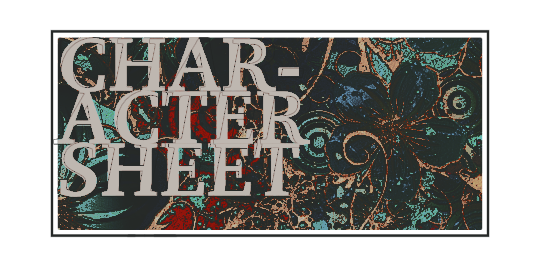
BASICS.
VEIL NAME: Serot Binu Napaut SPIRIT NAME: Refhremmit SOBRIQUET(S): The Saint Eternal; the Deathless Saint; Beetle Lord TITLE(S): Hegemon of the Anactaci; Spiritual Advisor to the Monarch of Meket RACE: Human NATIONALITY: Meketi ETHNICITY: Meketi RELIGION: Soshist BORN: -351 DR / REBORN: 1490 DR GENDER: Demi man (he / they) ORIENTATION: Panromantic pansexual

STATS*. *as of lvl 12
STRENGTH: 8 DEXTERITY: 16 (+1) CONSTITUTION: 14 INTELLIGENCE: 20 (+2) WISDOM: 12 CHARISMA: 11

CLASS, FEATS, ETC.
LINEAGE: Reborn BACKGROUND: Spirit Medium CLASS: Ghul Lord; will eventually respec to Anactaci (Aritas) DARK GIFT: Echoing Soul FEAT(S): Linguist (Meketi, Midani, Common, Celestial, Abyssal, Infernal)

PERSONALITY.
ALIGNMENT: Chaotic Good MBTI: ENFJ (Protagonist) ENNEAGRAM: 1w9 (Idealist) TEMPERAMENT: Phlegmatic FLAME: Sun

APPEARANCE.
FACE: Rectangular in shape with a defined jaw and overbite HAIR: Raven black with strands of silver; loosely curling, typically cut short EYES: Honey brown in color; round and wide, framed by straight lashes SKIN: Bronze toned, embellished with laugh lines and crow's feet SCAR(S): A moderately thick scar cutting through the right side of his lips; a slash across his chest down to the abdomen TATTOO(S): A rayed eye on the forehead (originally indigo, now luminous gold); a luminous golden band around the left ring finger; an indigo lotus on the throat; an indigo scarab on either palm; three indigo lines between the right eye and ear HEIGHT: 5'7" BUILD: Decidedly average, perhaps verging on trim; the build of a scholar, not warrior MISCELLANEOUS: A line of luminous golden runes across his throat where a knife might run if it was slit FACECLAIM: Rami Malek

BIOGRAPHY.
I'll put links to write-ups on Serot's other lifetimes here once I write them up.
OVER A THOUSAND YEARS AGO, a famine swept the young nation of Meket. Kheprer, strange beetles from the Negative Energy Plane, had somehow crossed over. They burrowed into the rich, black soil and sucked the very life from it. Though they moved slowly, they were indomitable, and their corruption was nearly impossible to cleanse. Crops failed, livestock withered, and people starved. Some said it was a punishment from the One Above for the death of the One Below. Other said it was a punishment from the One Below for going astray. Others still labeled it a conspiracy of this group or that. Whatever their origin, one thing was clear: they would quickly be Meket's ruin.
Serot was no more than a boy when they appeared. He belonged to a massive family, even by Meketi standards. Twenty siblings, forty-nine maternal relations, and nineteen paternal — all living as closely as possible. He loved it. But, the famine made it nearly impossible for them to feed everyone. No one wanted to part, but the alternative was starvation. The youngest children were fostered by relations or close neighbors. Those old enough to care for themselves found they must do so, though family made arrangements where possible.
Serot fell into the latter category. He was twelve years old when he found himself apprenticed to a ghul lord. As the death toll rose past what Meket could manage, so too did the restless dead. There were none better equipped to address this problem than ghul lords, whose number were then too few to meet demand. A few particularly skilled individuals were even able to ward off the kheprer (though nothing could be done once they had struck). His mistress was one such individual. He traveled with her across the country, learning the craft through practical application.
Whether by raw talent, firm dedication, or a combination of both, he proved uncommonly adroit. He innovated as he learned, thinking always of a way to end the famine and return to his family. Within eight years, he had managed it. The kheprer were creatures of negative energy. Manipulating that energy allowed him to command them. There was a limit to how many he could command and how he could direct them — he was yet young, after all — but it was the turning point.
Monarch Meresankh took notice. All resources were placed at his disposal to rid Meket of this menace. His first act was to trace the origin of these creatures as near as he could. They had burst from the earth in a small farming village, overwhelming the inhabitants and reducing it to a ghost town in a matter of days. No one had been brave enough to enter since. Serot set about investigating the ruins and questioning the dead. But, he did so with uncommon compassion. He squared away any unfinished business or promised to. He prepared their bodies and buried them with respect. He gave them peace in their deathly torment.
It was this that caught the eye of Refhremmit. The spirit of that small land was the only being left to mourn them. Though sickly themself with the kheprer's rot, they honored the dead who, in life, had honored them. They communicated with Serot at first indirectly. They led him to particular places, sent him signs, gave him tests, watched him. Satisfied as to his character, they finally entered his dreams. An agreement was made. If he would lead the kheprer there, Refhremmit would lend their power to bind them. There was no guarantee it would work, but it was their only chance.
Serot then set out to gather every willing ghul lord. Together, they shepherded the kheprer toward the town, and there they were bound. Not gone but finally contained. Priests came behind to cleanse the land and get food growing again. It would take time to heal from the damage, but at least it had become possible. Serot was appointed the Spiritual Advisor to Monarch of Meket, and became a living legend.
His experiences during the famine and its aftermath had shaped him, however. Particularly the loss of his family who, by the time he was able to return, were dead or scattered. He founded the Anactaci: an order of priestly necromancers who would shepherd the dead, comfort the living, and commune with all souls and spirits. He broke ground on the first and grandest City of Eternity, which would house the dead, over the ruins of Refhremmit's town, and the kheprer were set as eternal tomb guardians.
But, the deeper Serot delved into this work, the more his health suffered. It was not merely stress that affected him but the Plane of Death itself. The more he called on it, the more it drained his life. All the more when Meresankh made an ill-fated choice, and Serot bound their souls in an attempt to save them. Refhremmit helped him counter this by deepening their bond, twining them closer til they were almost indistinguishable, but even that could only do so much. Finally, Refhremmit proposed that Serot should truly join with them. Let their spirits merge. Let Serot be freed from earthly trials. Together, they would guard the Cities of Eternity and shepherd souls onto the afterlife. This would mean his death, but he was already dying. What sweeter rest than that in the arms of one who loved you well? In a ritual combining both marital and funerary rites, he gave himself to Refhremmit.
The outcome was not what they had anticipated. Rather than merge, they were tethered. Serot's soul was unable to pass on; one half was tied to Meresankh and the other to Refhremmit. Thus he has been reincarnated repeatedly throughout the ensuing centuries. He has been every combination of gender identity, social class, profession, fortune imaginable. Sometimes famous, sometimes obscure, sometimes tragic, sometimes triumphant: the only true constant has been Refhremmit.
As Refhremmit has accompanied all of his lives, so have they accompanied all of his deaths. At last, they exerted all of their power over the bond to affect the cycle of reincarnation. It could not be broken but Serot could be reborn. In the body from his first life (with only a few alterations) and all the grave goods Refhremmit deemed necessary, he awoke blinking beneath the Faerûnian sun.
Alas there is always a catch. He remembers he is from Meket on the continent of Zakhara. He remembers he is (was?) a member of the Anactaci. He remembers a cool voice calling him Serot. All else is hazy. He was nabbed by the Nautiloid shortly after and infested with a tadpole. As he seeks to unravel the mystery of the Absolute, he must likewise unravel the mystery of his identity.
#CHARACTER SHEET.#I'm not paying for a higher level carrd account and I don't feel like fiddling with a fancy theme so#this seemed the best way to organize all this info
4 notes
·
View notes